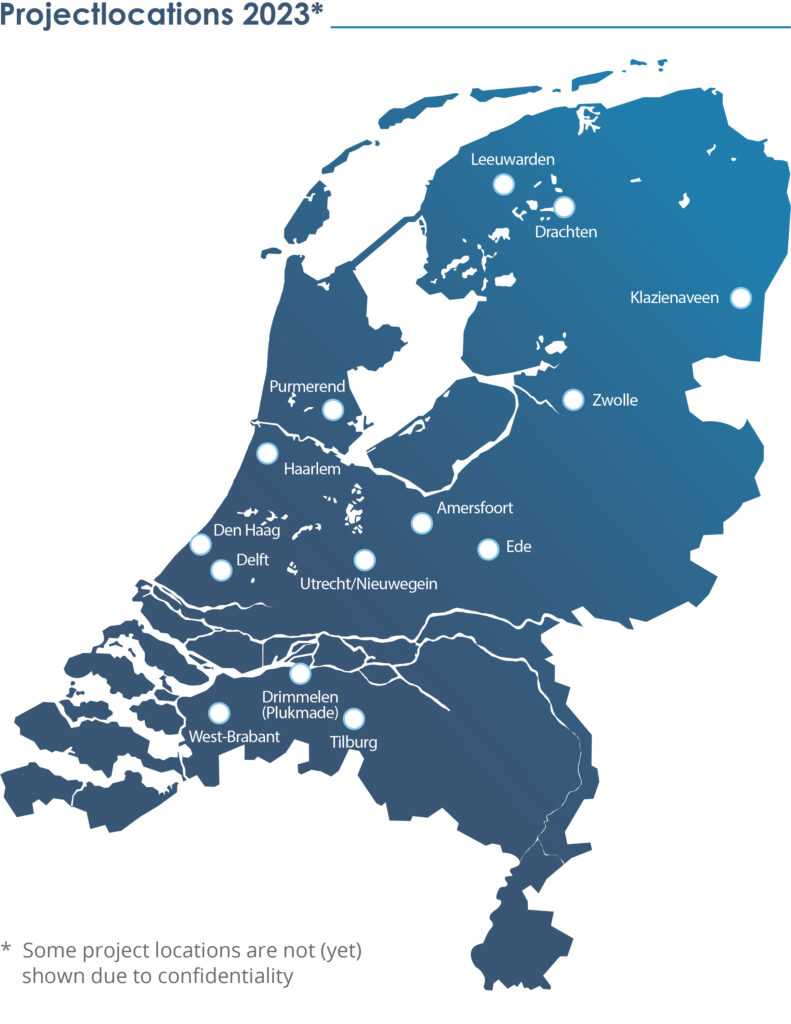What role does geothermal energy play in the Dutch energy transition?
Geothermal energy is indispensable in the energy transition, according to the WARM study. The latest estimates show that more than a quarter of Dutch homes – about 2.6 million – can be heated using geothermal energy in the future. Currently, geothermal energy is mainly used to heat commercial greenhouses. But it is clearly a very promising source of heat for homes, shops and offices too. EBN is working with the geothermal sector to develop geothermal energy in the built environment. In the Netherlands, geothermal energy is legally defined as thermal energy (heat) collected from strata at a depth of 500 metres and deeper.
Geothermal energy and heat networks
EBN sees geothermal energy as a key basic source in making existing and future Dutch heating networks more sustainable. About 26% of the total heat demand of the built environment in the Netherlands could potentially be met with geothermal energy supplied through heat networks. Depending on the capacity of the source, a single geothermal heat network can sustainably heat around 4,000 to 7,000 homes. As a ‘base load’, it provides a constant and reliable source of heat. EBN has been asked by the Ministry of Climate Policy and Green Growth to look into and provide input on what the public financing of the current and future heating value and supply chain could possibly look like.
EBN’s role in geothermal projects
EBN was set up as a national ‘policy holding’ of the Ministry of Climate Policy and Green Growth to represent the Dutch State’s social and economic interests in the subsurface resources in the Netherlands. In line with this mission, EBN was given scope in March 2019 to voluntarily participate in Dutch geothermal projects, as long as the project initiator invites EBN to participate. An amended law governing the extractive industries in the Netherlands will come into effect on 1 July 2023. Under this new legislation, EBN must have a share in new geothermal projects. In addition to having a financial stake, EBN is closely involved in or even initiates scientific research into the potential of geothermal energy in the deep subsurface. We also contribute to the development of new industry standards, and we advise the Ministry of Climate Policy and Green Growth on geothermal energy. Together with TNO, we are also conducting the largest seismic study into geothermal heat potential under the name ‘Seismic campaign for geothermal energy in the Netherlands’, which goes by its Dutch acronym SCAN.

Principles of EBN’s stake in geothermal projects
As with its co-investors, EBN participates at its own expense and risk, and focuses on developing safe, responsible and profitable projects. With this approach, EBN aims to help shape the way in which the sector can be strengthened and accelerated, as well as how the public subsurface can be used optimally and sustainably. This form of risk-bearing participation is comparable with the way in which EBN now invests in its oil and gas projects. EBN is currently involved in a large number of ongoing geothermal projects, and final investment decisions have been taken for the Leeuwarden Heat project and the Geothermal Delft project. In Leeuwarden, research into high-temperature aquifer thermal energy storage (HT-ATES) is also providing additional insights. Additionally, through its stake in Haagse Aardwarmte B.V., EBN is actually supplying geothermal heat to the heat network in the Leyweg district of The Hague.



